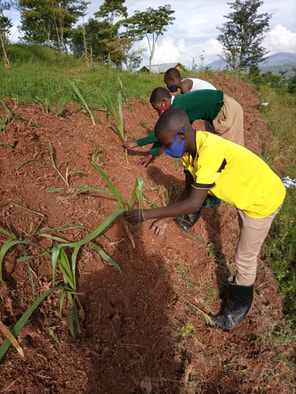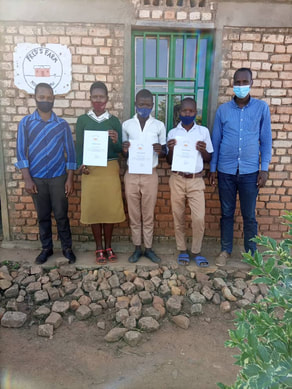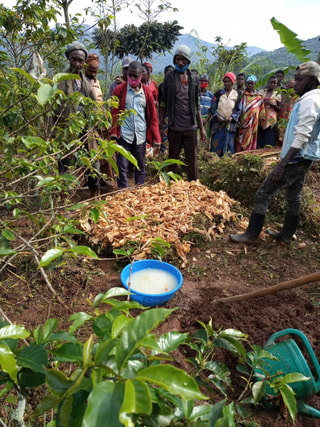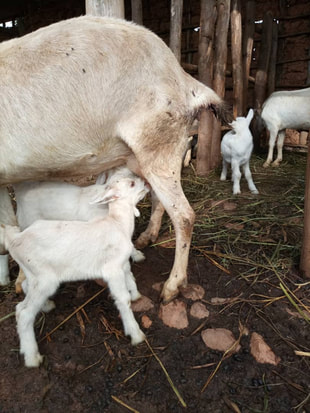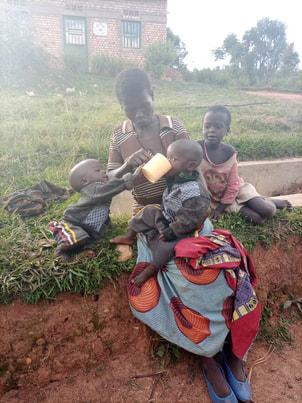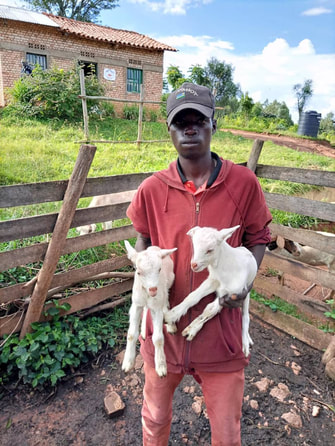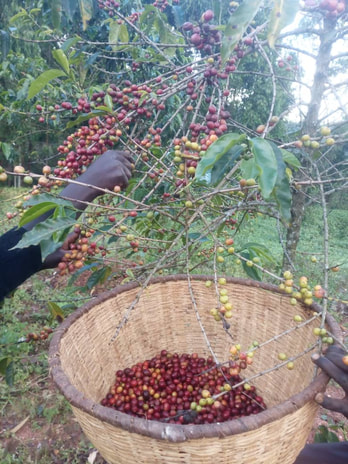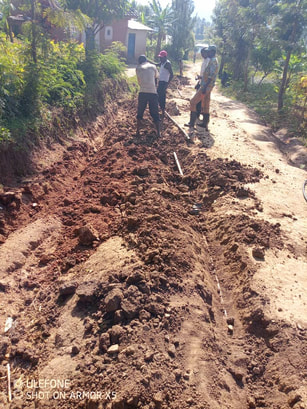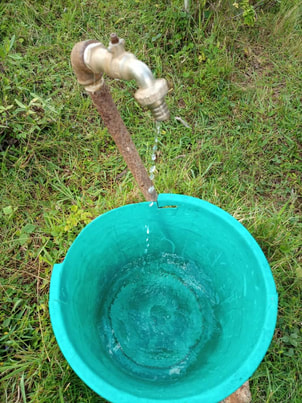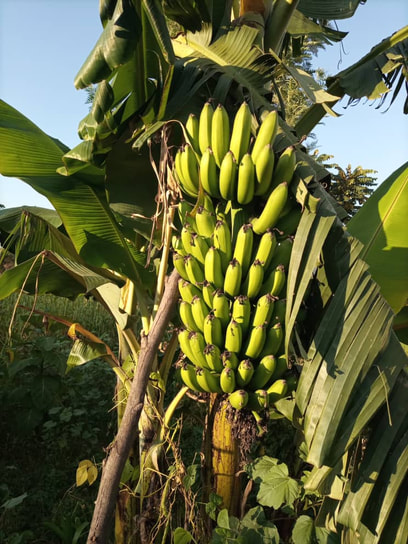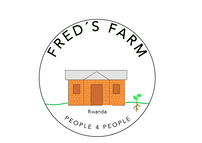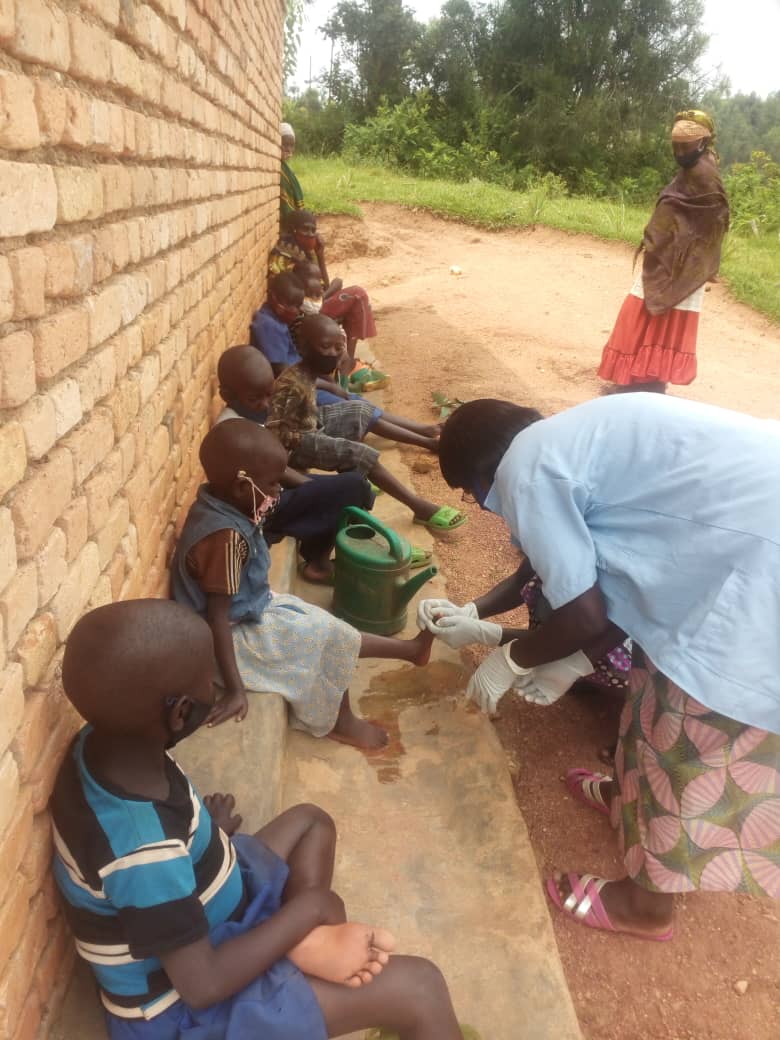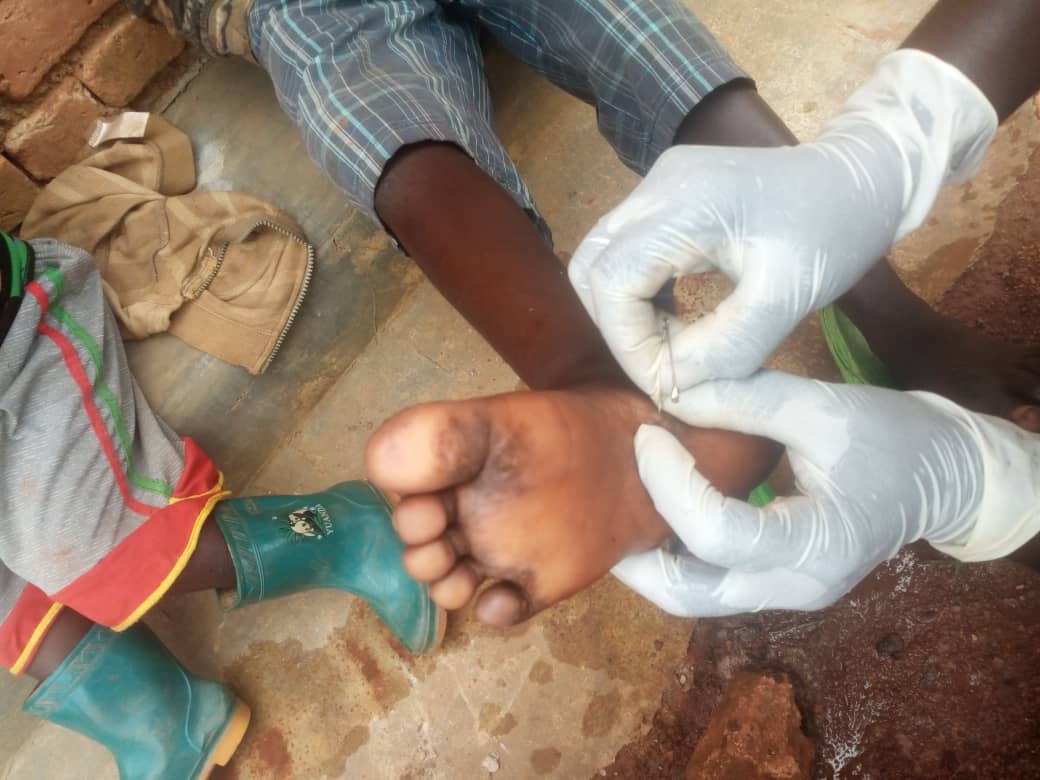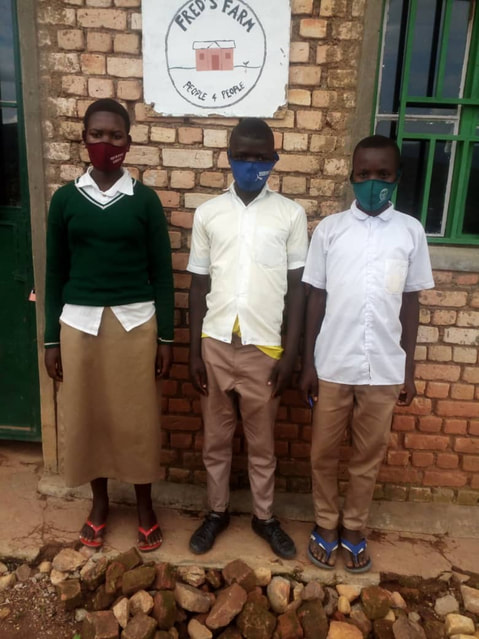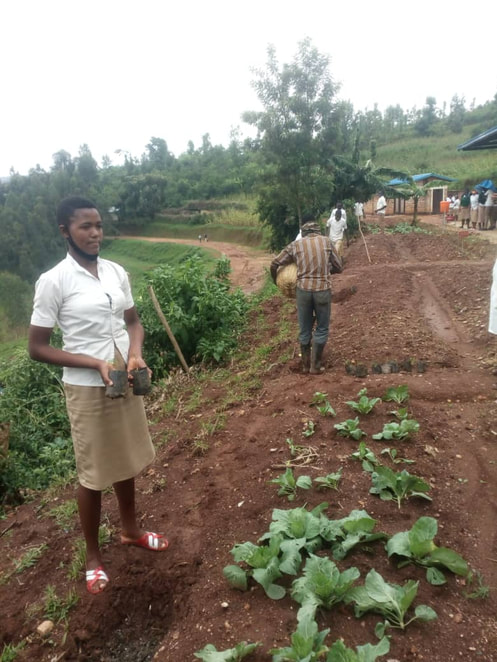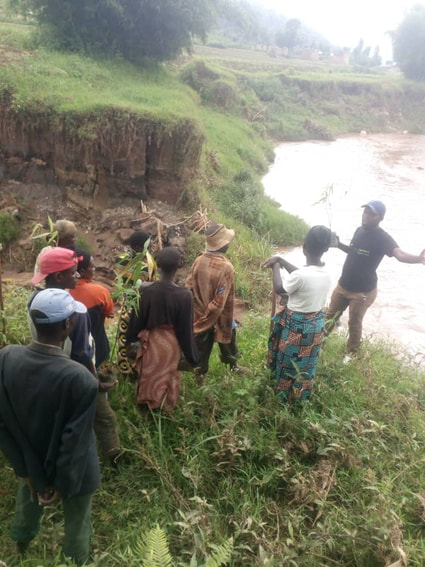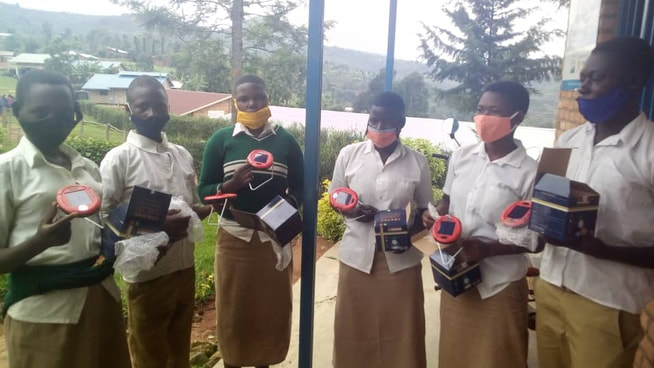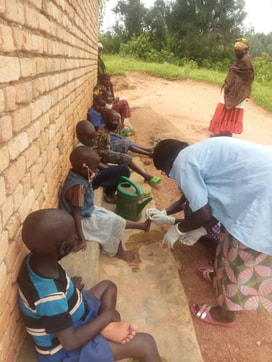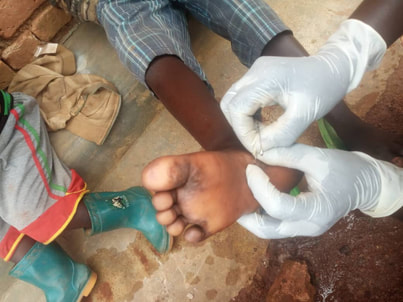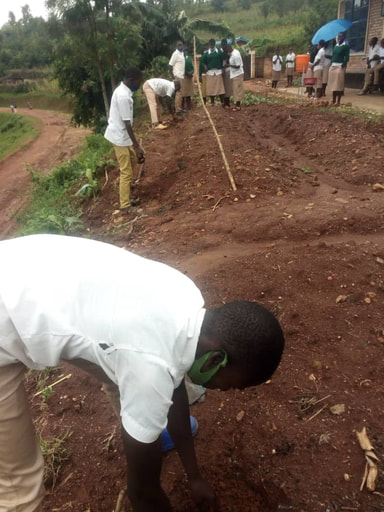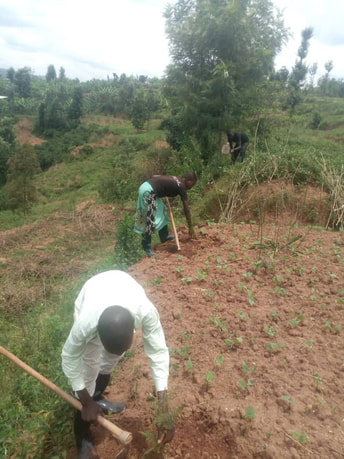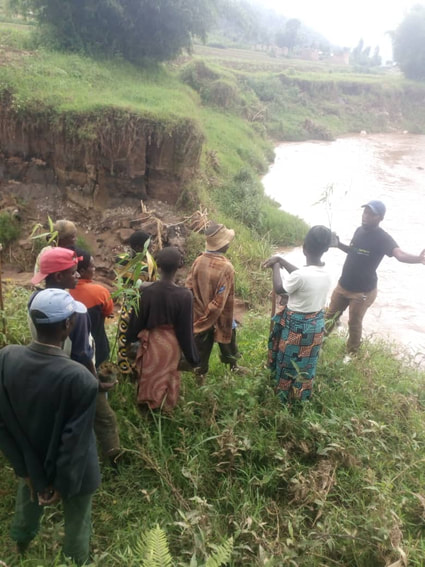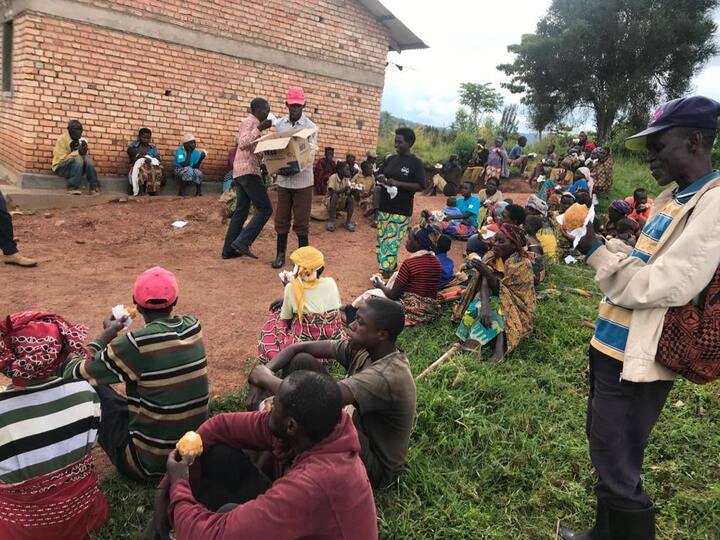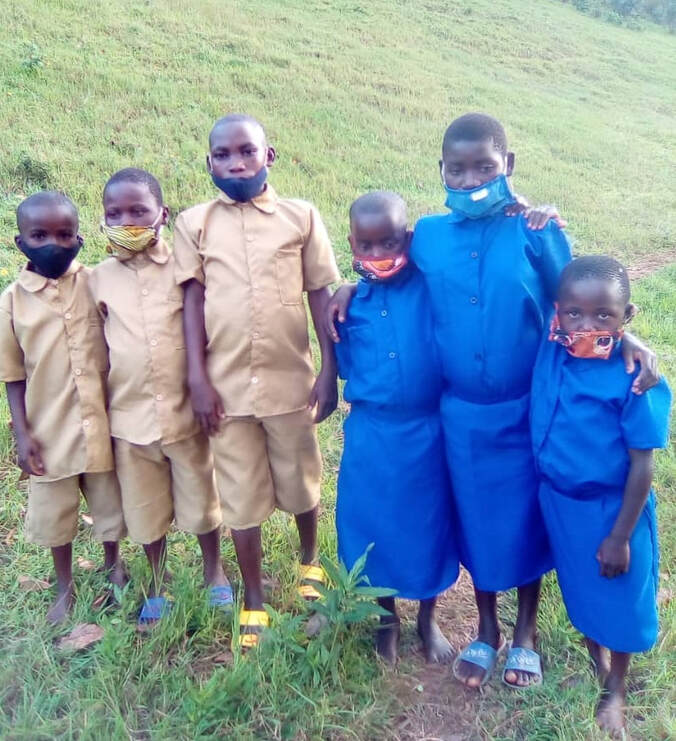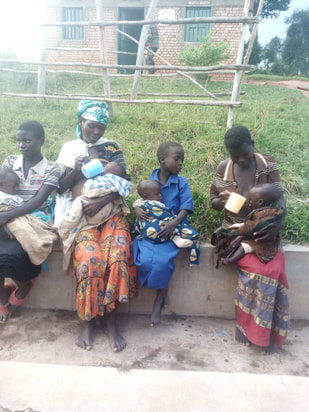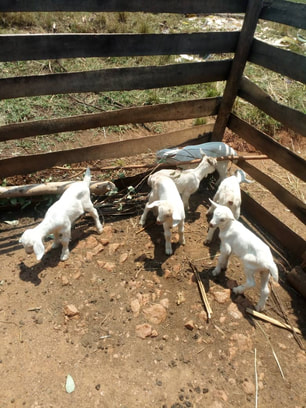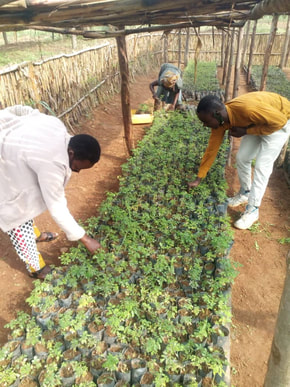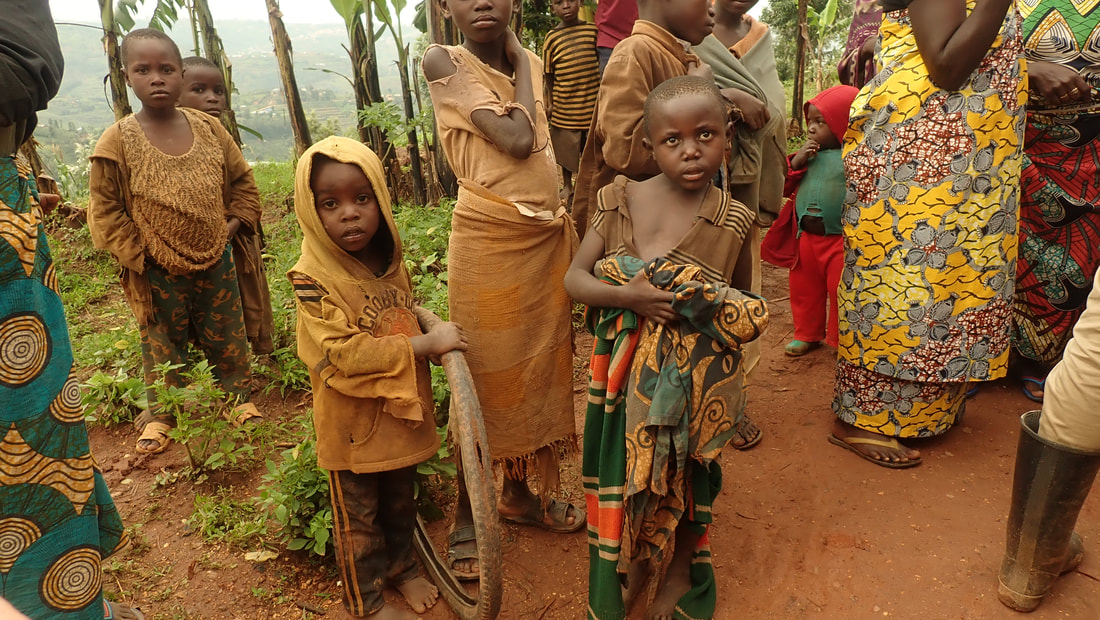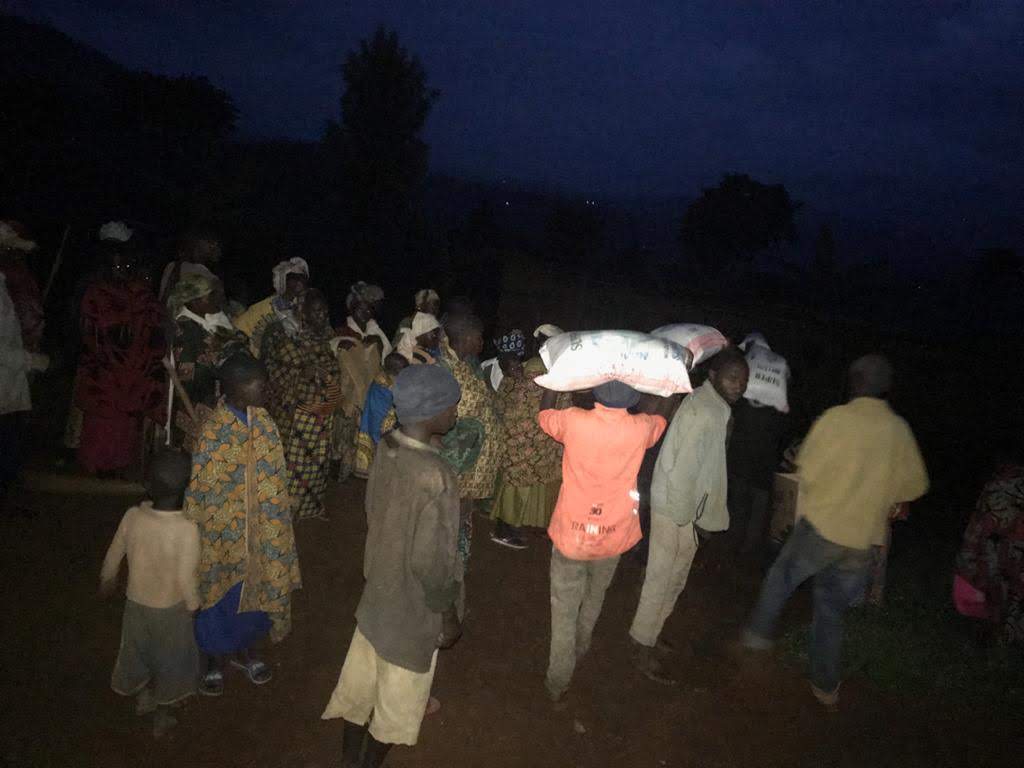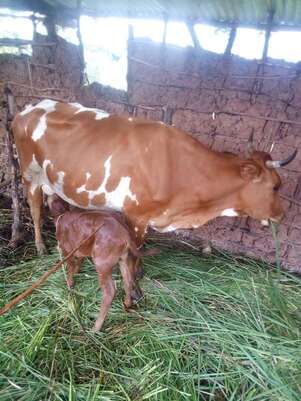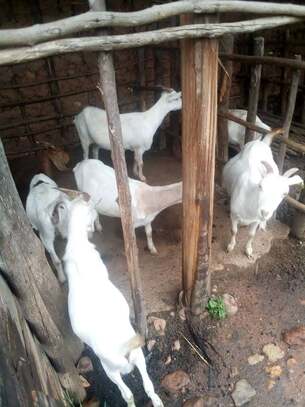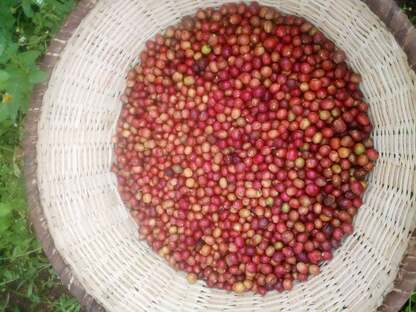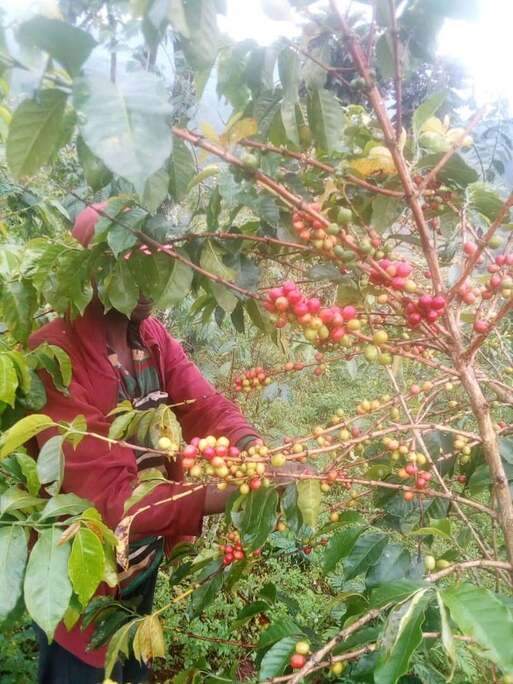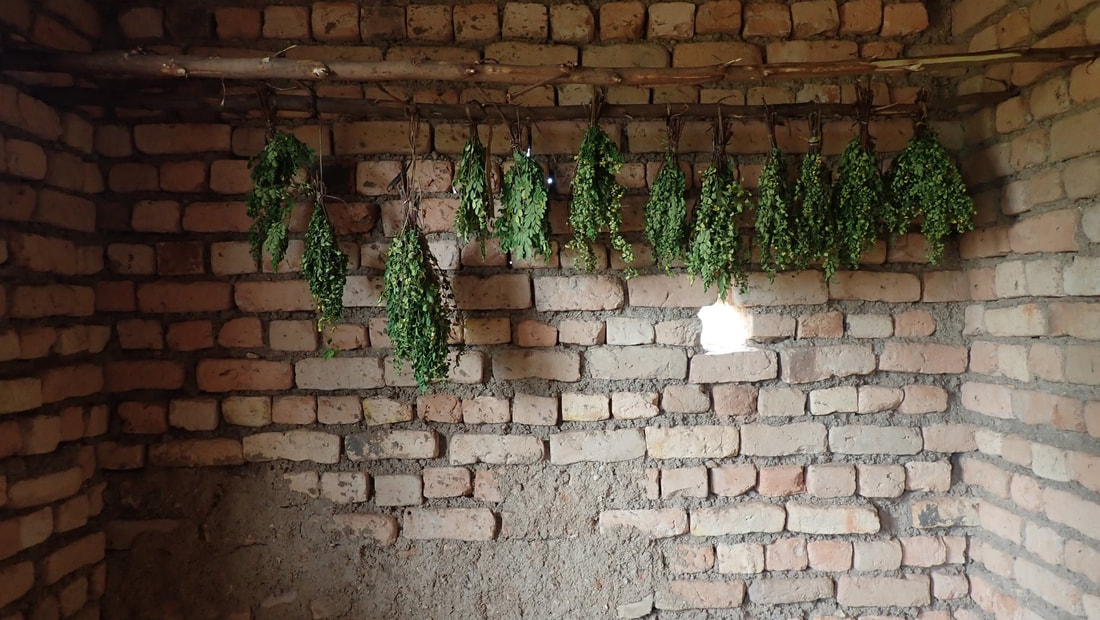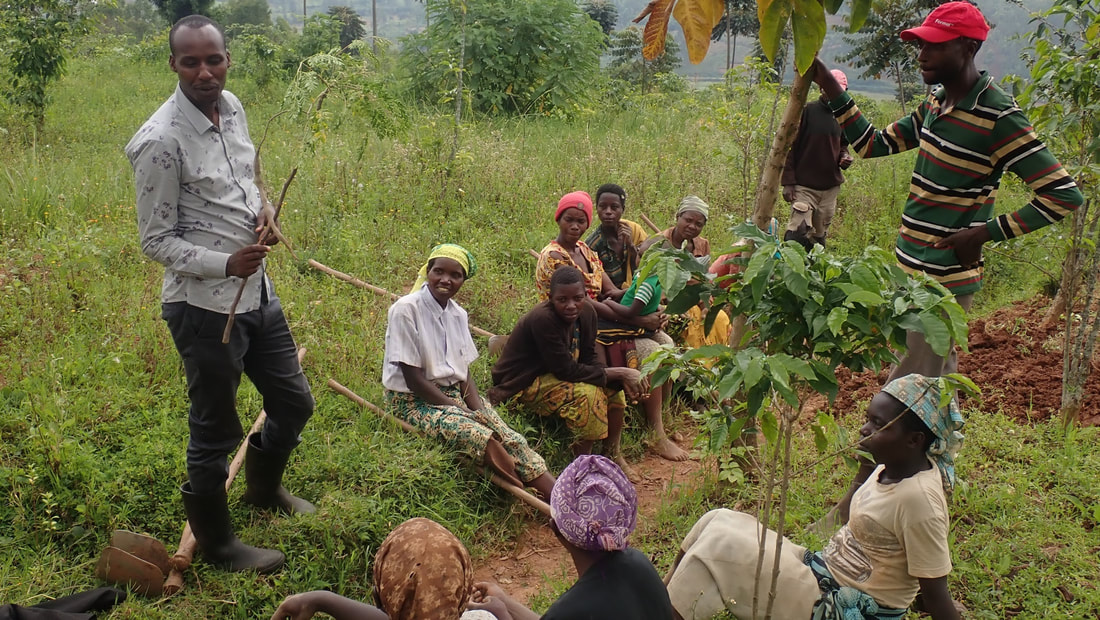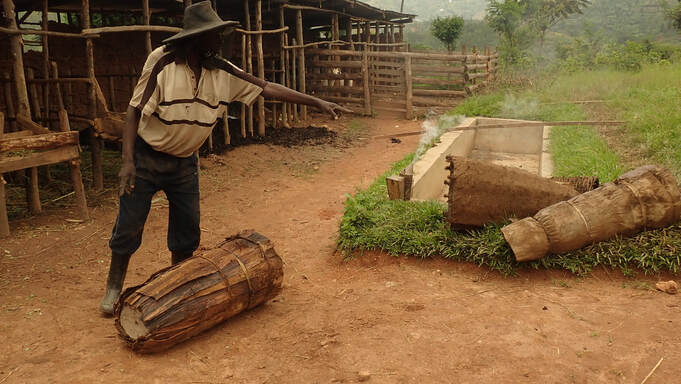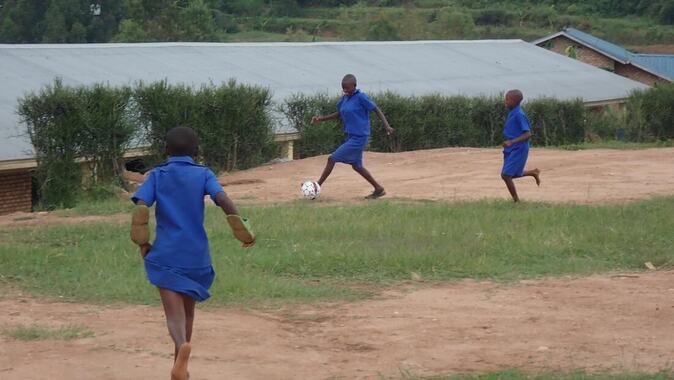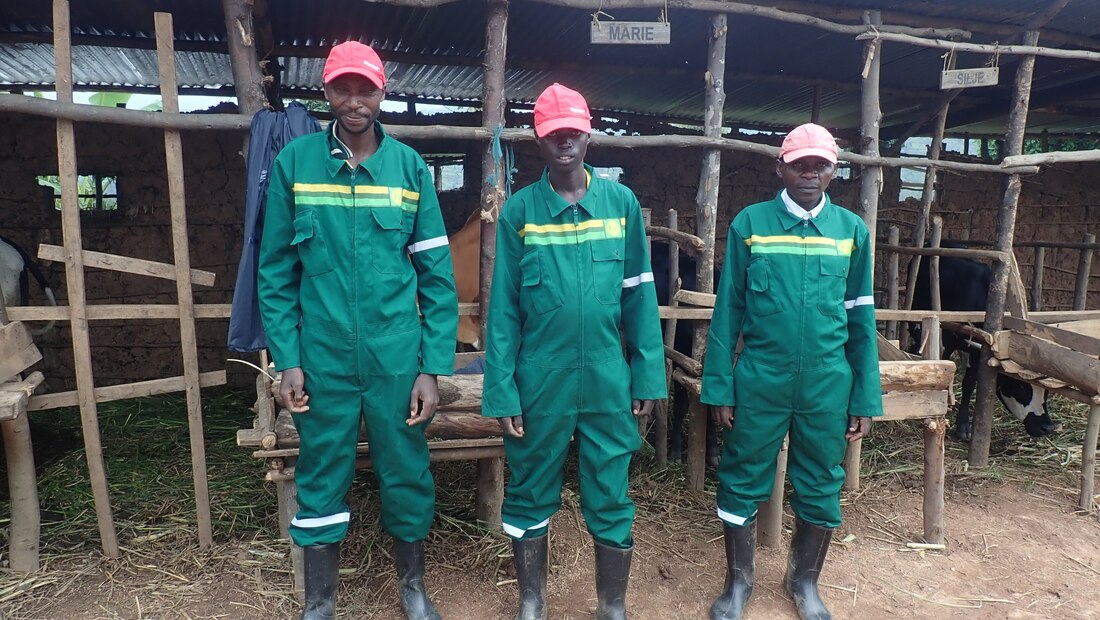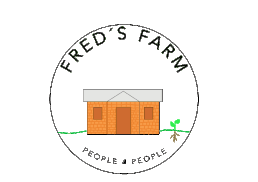 Update June 2021 Highlights + The first Internship programme for 3 school pupils is completed. + Farmer training for 193 farmers is completed. + Goats, 3 new kids, and 14 litres of milk pr week to the most needy. - Very poor coffee yield this season. - Water supply was broken for 3 weeks. Internship programme The first 3 pupils from Kizi school have now successfully completed a 12 week internship programme on FRED'S FARM. Health insurance for 2021 was paid for all three. The small payment the pupils received pr week as a motivation to take part, left them able to buy school meals, exercise books and pens for school and clothes. With the final "savings" payment, all three bought animals which they plan as a "business" to help support their families. Marie Rose has bought a piglet, Emmanuel 2 hens and Evariste a goat. Each pupil wrote a final report of 11 pages where they describe all the activities they participated in, and what they learnt which can be useful in their home setting. These pupils come from the poorest families in the area - our aim is that their new knowledge will help lift the whole family and come a step closer to self-sufficiency. The school principal and teachers have given us very positive feedback about the programme. Jacques has been motivated by the pupils' enthusiasm, their desire to do practical work and learn. Jacques has noticed the pupils become very tired, and suggests we reduce the number of days the pupils attend from 6 to 3. We plan for a new group of pupils to start their internship programme on 03. July after exams are finished. This activity is outside our budget - will you help support? Total cost for one pupil for 12 weeks is approx. kr.450. Farmer Training 193 farmers participated over a 5 week period from mid April to mid May in a training day on FRED'S FARM. Jacques led the training session about making compost heaps without use of animal dung. Most of these small farmers do not own animals, and use "Yara" nitrogen fertilizer. All grow coffee on a very small scale. Gaining knowledge about alternatives to chemical fertilizer, giving them the possibility to aim for an organically grown coffee crop, something which gives higher sales prices. Several of these farmers have already started making compost heaps on their own property. This is part of our program to give the farmers better knowledge in more sustainable farming methods. Goats 3 new healthy kids have been born, providing more milk for yet another vulnerable family. Altogether there are now 16 dairy goats on FRED'S FARM. After more than a year of "trying", identity tags for the goats are now in place - all our goats have ID tags in their ears. This is another step towards putting in place a breeding programme with the local goats, which we hope know to start implementing in the autumn. By breeding our dairy goats with the local goats, the aim is to provide goat milk for the local population. Goats require less land and less food to produce one liter milk. Coffee The coffee harvest is finished, and it was the worst ever! After 4 years of intense work on the coffee, we must accept that most of the coffee bushes damaged by hail several years ago, have not recovered. So all the non- or little productive bushes are being removed, and in the next rainy season, September/October, we will replant. Coffee is one of 2 cash crops on FRED'S FARM which in the future will provide income to run the project. Water supply In May, the water pipe supplying FRED'S FARM was damaged in the village close to the farm. Three long weeks at the beginning of the dry season without access to fresh water is a long time. Our water tanks ensured there was more than enough for the animals, but watering plants wasn't carried out as we didn't know how long it would take to get the pipe fixed. 13 moringa tree saplings died, as did some newly planted napier grass (forage for animals). Last week the pipes were fixed and the tanks filled - now we're ready to face the dry season! Food for our staff Food production on the farm for our staff has increased; peanuts, avocados and beans have been grown and shared with the Twa (pygmy population who live close to the farm). Fruit is ripening and will be ready for harvesting at the end of the dry season; bananas, papaya, tree tomatoes and passion fruit. Moringa trees are maturing and leaves provide nourishment. We aim to provide some daily nourishment to our staff. Other COVID-19 Movement between different areas in Rwanda has been prohibited from the start of the pandemic in March 2020 until the beginning of June 2021. For those who survive by doing day labour, it has meant little work, and little food. We have tried to maintain some jobs on the farm. For FRED'S FARM, this has made sale of the cows impossible and access to the veterinary surgeon has been limited. In addition, nobody from the support team in Norway has been in Rwanda, so we have had no coffee for sale to support the project. THANK YOU to all who have supported FRED'S FARM in this period. Our basic activities have continued, and our extra activities have provided much needed employment to many living in extreme poverty. We are especially grateful to those who give every month, providing a more predicable economy. We do hope that some of you who read this will consider this option:) At the moment we need another kr 2500 /month to cover our monthly cost !! BANK INFORMATION Bank account number: 4212 24 53957 IBAN: NO58 4212 24 53957 BIC/SWIFT: SPTRN022 Bank name: SpareBank 1 SMN, Postbox 4796 Torgarden, 7467 Trondheim, Norway
1 Comment
UPDATE FRED’S FARM, March 2021 Yippee!! We’ve had a wonderful start to 2021! 😊 January 2021, we were very unsure about the coming year. Our thoughts were focused on how best we could keep activities functioning on and around FRED’S FARM. Three months on, after many online meetings with Rwanda and much deliberations, we’ve managed more than expected. We have:
JIGGERS: We invited all with “Jiggers” in the Twa village to come to FRED’S FARM for medical treatment. Both children and adults came forward, in total 17 people. Enough funding for all 17 treatments was secured, approx. £20/treatment. Treatment of the parasite was carried out in February. In addition preventative measures were put in place; instruction in washing their feet with soap and wearing footwear. Both soap and footwear were provided. The condition is painful as the parasite burrows into the feet, lays eggs causing infection. The condition is also connected with shame resulting in people trying to hide from social contact. Children cannot attend school if they have Jiggers. The adults who were treated will in time be able to look after their families again. INTERNSHIP PROGRAMME: Three pupils, Marie Rose Tuyishime, Emmanuel Rwabituku and Evariste Rizinde, were selected by the headmaster and began as interns in March. All three pupils come from vulnerable families in the area. The prime aim is to lift the status of agriculture and cultivation, and to get hands-on training in practical, sustainable farming. Gained knowledge can in turn be used in their home setting. They come to the farm for 12 weeks after school and on Saturdays. To motivate the pupils, they get paid a small amount every week. The students who complete this programme get a diploma and a small sum of money to start a small agricultural project at home.This is a pilot project which we shall evaluate at the end of May. The school is exceptionally positive to this project. SCHOOL FOOD: 50 moringa saplings were given to the local school in February. The pupils planted the trees. In addition Jacques has ensured the pupils know about the high nutritional value moringa. Moringa leaves will in time be used in the school lunch. DEMO PLOT: This area will have a large variety of perennial trees and plants which provide edible, nutrition - rich food through the whole year. In February we planted 10 mango, 10 avocado and 10 papaya seedlings. In addition 50 calliandra and 50 grevillea (used for animal feed, shade and ground cover) tree seedlings. There are already moringa saplings established in this area. All of these plants are trees, and will form the perimeter of the plot. In September, in the next rainy season, other plants will be planted. This demo plot will function as an educational tool, an example of how a small holding can be planted to get maximum output. Farmers, school pupils and anyone else who wants, can visit this demo plot. The interns from the school are helping to plant, weed and care for it. FARMER TRAINING: 50 farmers, including 30 people from the Twa village were invited to come to the farm for a teaching session on planting and caring for moringa. All 50 received two moringa tree seedlings each to take home to plant. They will be followed up by our agriculturalist, Jacques, and the district agriculturalist. Moringa trees, primarily the leaves, are very rich in nutrients. BAMBOO: Over the past years we have been doing background research to start a bamboo project. Several organizations in Rwanda and elsewhere have been contacted, both to learn and try to find competent people to help us. In March, we carried out the first phase of the plan; 500 bamboo plants were planted in a 5m belt on a 2 km stretch of the river on Fred's land. This is done to prevent erosion and soil loss during flooding, a dramatic annual occurrence. We invited 10 farmers who cultivate land close to the river to work for us for a week to help plant, and learn. In addition we employed Patrick, a technician from the company where we bought the plants to train both Jacques and the farmers. Once established, the bamboo is a valuable resource and can be used as a building material, as animal fodder and as fuel. In addition to the 500 plants which are planted, we have a further 300 which will be planted in the near future in other areas close to Fred’s land which are exposed to flooding. This work will be carried out in collaboration with the local authorities. SOLAR READING LAMPS: The solar lamps we gave to the school just before the COVID-19 lock down (and school closure) in February 2020, are now in use! These 47 lamps are borrowed by final year students, and some teachers. There is no mains electricity in this area. We will follow up use of the lamps to see if the system functions as intended. The lamp library was put on hold as the school was closed from March til December. OTHER
In 2021 we anticipate uncertainty and restrictions due to COVID-19. At present in Rwanda there are various travel restrictions between the different districts in the country. For us this means we can’t sell our cows as planned last year. Several people in different areas of the country have expressed interest to buy some dairy goats - this also is not possible. BUT the school opened in December 2020, and daily workers in the agricultural sector can work. A big thank you to all who have supported FRED'S FARM. This makes it possible to keep the basic activities going and to develop. In this way we can support a large group of people who live in poverty, some on the brink of famine. As mentioned before, COVID-19 has made their situation extra challenging, and our continued activities have made an enormous positive difference in these difficult times. In the past months more people now give monthly to the project, and we are especially grateful for this! But to have a predictable economy, we do need more. So we hope that there are some of you who will consider this:) Bank information Bank account number: 4212 24 53957 IBAN: NO58 4212 24 53957 BIC/SWIFT: SPTRN022 Bank name: SpareBank 1 SMN, Postbox 4796 Torgarden, 7467 Trondheim, Norway 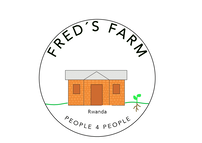 Jippi. Vi har hatt en knallstart på året 😊 Ved inngangen til 2021 var vi meget usikker til det kommende året, og tenkte mest hvordan vi skulle oppretholde aktiviteter som allerede var i gang. Nå etter 3 måneder med mange nettmøter med Rwanda og mye vurderinger, har vi oppnådd mye mere enn forventet. Vi har:
JIGGERS: Behandling av parasitten "Jiggers" (som angriper føtter) er gjennomført i Februar. Det ble samlet inn penger til 17 behandlinger (kr200/behandling). Både barn og voksne ble behandlet. I tillegg fikk de opplæring i forebyggende behandling, fotvask med såpe og bruk av sandaler. Samtlige var fra Twa-landsbyen. Tilstanden er smertefull og forbundet med skam. Det er en forutsetning at barn er fri for Jiggers før de begynner på skolen. De voksne som ble behandlet blir igjen istand til å forsørge familien. 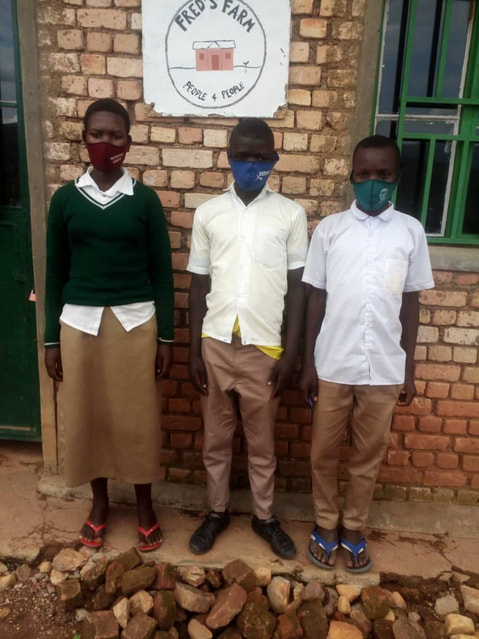 INTERNSHIP PROGRAMME: "Lærlingprogram" for skolebarn. Hensikten er å øke status på jordbruk og å få opplæring i praktisk anvendvar bærekraftig jordbruk til bruk hjemmet. Elevene vil etter fullført program få en diplom og skal gjennomføre et prosjekt som involverer skole og hjem. Tre elever er plukket ut av rektoren på skolen. De skal være på gården i 12 uker etter skoletid og på lørdager. For å oppmuntre elevene til å komme får de betalt litt. Dette er et prøveprosjekt som vi skal evaluere på slutten av mai. Skolen stiller seg veldig positiv til prosjektet. Alle tre elevene kommer fra de mest sårbare familiene i samfunnet. SKOLEMAT: Utplanting av 50 Moringatrær på skolen. Bladverket skal brukes i maten som barna får i skolelunsjen. Elevene selv plantet trærne. Skolebarna har også fått informasjon om Moringas ernæringsverdi. 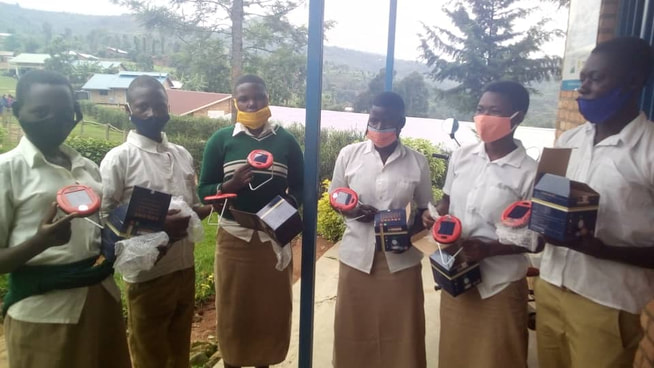 LESELAMPER: Solcellelampene vi ga til skolen rett før COVID-19 i Februar 2020 er i bruk! De 47 lampene lånes nå ut til avgangsklasseelever og noen lærere. Vi vil følge opp bruken av lampene for å se at det fungerer etter intensjonen. Prosjektet var i dvale i fjor etter skolen ble stengt Mars til Desember. DEMONSTRASJONSGÅRDSHAGE: Vi har startet etablering av et område på FREDS FARM. Dette området skal fungere som et eksempel på hvordan et lite jordstykke på en gård kan være. Dette skal brukes i opplæringsøyemed. Området plantes med et utvalg av flerårige vekster som gir spiselige, næringsrike vekster gjennom året. Bønder og skoleelever kan besøke hagen for å se hva og hvordan en liten jordlapp kan plantes best mulig. Lærlingelevene skal delta i dette arbeidet. FARMER TRAINING: 50 bønder, inklusiv 30 personer fra Twa landsbyen, ble invitert å komme til gården, til opplæring i planting og stell av moringa. Samtlige fikk 2 planter hver hjem med seg. De blir fulgt opp hjemme av vår agronom, Jacques, og distriktsagronomen. Moringa trær (primært bladverk) er et viktig bidrag til å bedre ernæringstilstand. BAMBUS: I flere år har vi vurdert å sette i gang et bambusprosjekt. Vi kontaktet mange organisasjoner for å lære og for å finne kompetente folk å hjelpe oss. I mars er det gjennomført den første fase dvs. planting av 500 bambusplanter langs en 2 km strekning langs elven på FREDS FARM. Dette er gjort for å begrense erosjon og tap av jord i flomperioder. Ti småbønder som dyrker jord langs elva på FRED'S FARM ble ansatt for å plante. På sikt ønsker vi også å kunne benytte bambus som et materiale for forskjellige aktiviteter. Tre hundred planter var til overs. Disse skal plantes i samarbeid med lokale myndigheter på flomutsatte områder langs elva som er i nærheten av FREDS FARM. ELLERS: Også i 2021 forventer vi usikkerhet og ulike restriksjoner pga COVID-19 i Rwanda. I skrivende stund er det fortsatt bevegelsesrestriksjoner mellom distrikter, noe som fører til at vi ikke kan selge kyrne som var planlagt i fjor høst. Positivt er det at den lokale skolen åpnet desember 2020, og at jordbruksarbeidere og dagsarbeidere kan jobbe i nærområdet. En stor takk til alle som har støttet FREDS FARM. Dette gjør det mulig å holde prosjektet i gang og videreutvikle det. På denne måten hjelper vi en stor gruppe mennesker som lever på randen av sult og fattigdom. Som tidligere nevnt, har det vært ekstra vanskelig pga COVID-19 så vår aktivitet har virkelig gjort en stor forskjell i denne perioden. I denne perioden har flere blitt faste givere, og vi er veldig takknemlig for det. Men for å ha en forutsigbar økonomi, trenger vi flere. Håper flere ser det som en mulighet:) Her er bankinfo for å sette opp fast overføring: VIPPS : 98539 Bank : 4212 24 53957 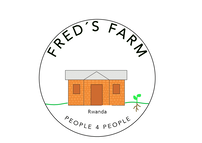 Et nytt år med nye muligheter! Under finner du en kort oversikt over 2020, og våre planer for 2021. Våre mål er de samme: Forsoning, selvberging, flere barn på skolen og bærekraftig jordbruk. Året 2020 Året var preget av COVID-19 men vi klarte å holde alle basisaktiviteter i gang. Under vårt besøk til FRED'S FARM Januar 2020, var det lagt et godt fundament for året. Dette hjalp mye selv om året ble veldig annerledes. Hovedkonsekvensene av COVID-19 for vår aktivitet:
Følgende klarte vi å gjennomføre:
Kaffe og Macademia Kaffe og macadamia er fortsatt en utgiftspost og vil være det i mange år. Men å jobbe med disse gir arbeid og kompetanse til mange. Fire nye personer ble fast ansatt for å passe på de 200 nye macademiatrær som ble plantet i januar. Et nytt kompostsystem er etablert for å sikre nok tilgang på jordforbedrende organisk materiale. Økonomi Vi holder oss flytende og har opprettholdt aktiviteten i prosjektet hele året. Etter iherdig innsats og mange gavmilde givere så ble det samlet inn kr. 170 000, utenom kaffesalg på kr. 30 000. Dette er ny rekord for prosjektet. Noen av pengene var øremerket nødhjelp. Dette gir oss en buffer på kr 50 000 når vi går inn i det nye året. Flere velger nå å gi faste månedlige bildrag, noe som gir mer forutsigbarhet. Pr. dato får vi kr 7000/mnd i faste bidrag. Vi trenger i tillegg ca kr 4000 /mnd for at det skal gå rundt. Vi håper flere vil vurdere faste bidrag 😊 . Bilde fra nødmat distribusjon i mai 2020 får stå som minne fra året som gikk Året 2021 Her er en oversikt over hovedaktivitetene for 2021: Generelt: Også i 2021 forventer vi usikkerhet og ulike restriksjoner pga COVID-19 i Rwanda. I skrivende stund er det fortsatt bevegelsesrestriksjoner mellom distrikter, noe som fører til at vi ikke kan selge kyrne som var planlagt i fjor høst. Positivt er det at den lokale skolen åpnet desember 2020 etter å ha vært stengt i ni måneder. Bærekraftig jordbruk
Støtte skolen/Flere barn på skolen
Selvberging
Cash crops Å passe på macadamia og kaffe gir arbeid til mange, og på sikt blir dette en inntekt til prosjektet. For at flere får kunnskap og bedre økonomi, har vi ansatt fire nye personer innenfor de samme økonomiske rammene som tidligere, hvilket betyr at det nå jobber åtte istedenfor fire. De jobber annenhver uke. Bambus-planting Dette er et nytt tiltak vi jobber med. Tanken er å plante bambusplanter langs elvebredden på FREDS FARM, for å begrense erosjon og tap av jord i flomperioder. På sikt ønsker vi også å kunne benytte bambus som et materiale for forskjellige aktiviteter. I 2021 jobber vi med å få lokale partnere på plass for å kunne gjennomføre den første fasen. Twa-barna i sine nye uniformer startet på skolen 04.01.21, får stå som et tegn på håp i 2021.
FRED'S FARM – September nyhetsbrev Sommeren, den varmeste og tørreste perioden i Rwanda, er nå forbi. De viktigste oppgavene i denne perioden er å vanne de mest sårbare plantene og passe på dyrene. For oss var det spesielt 200 macadamia trær, plantet i februar og mars, som måtte passes på. Fem dager i uka brukte Jacqueline, Peter, France og Samuel hele deres arbeidsdag på vanningen. Andre aktiviteter/hendelser i denne perioden
Geiter: En gladnyhet er at geitebukken vi kjøpte i fjor er kjønnsmoden og vi har fått 6 geitekillinger, 4 hunnkjønn og 2 hannkjønn. To av "mødrene" melkes, og melken fordeles til de meste vanskeligstilte familiene. Akkurat nå blir 21 litre geitemelk fordelt til 3 familier, 2 familier med tvillinger og en med flere småbarn. Disse familiene er plukket ut av den lokale lederen. Moringa prosjektet: Prosjektet går som planlagt. Frøene har spiret, og vi nå har ca. 2000 små moringa trær. Jacques er i dialog med de lokale ledere og distrikts agronom om hvordan vi best skal gi utdisse til småbøndene i området. Et felt med moringa trær er planlagt etablert på skolen.
COVID-19: I lokalmiljøet kan man nå reise normalt. Skolene er fortsatt stengte og åpner sannsynligvis tidligst i Januar. Dette har ført til at solcellelysprosjektet vårt på skolen stoppet opp. Nødhjelpen i form av mat vi ga i mai til TWA ble ikke videreført da det ble mulig å få noe dagsarbeid igjen. På gården videreføres håndvask rutiner og sosial distansering. ØKONOMI: Denne gangen blir økonomi et viktig punkt. For å si det enkelt, vi sliter pga følger av COVID-19 situasjonen. En av de store inntektskildene til prosjektet de siste 2 årene har vært salg av kaffe vi har fått fra Motherland Farmers vaskestasjon der Fred er medeier. Siden ingen fra Norge kan reise til Rwanda, har vi ikke fått kaffe siden Februar. En annen viktig inntektskilde har vært fra elevene på Skjetlein Videregående Skole. I flere år har inntektene fra deres "Dagsverk" gått til FRED's FARM. Siste skoleåret ble ikke dette gjennomført. Her er en kort oversikt over utgifter og inntekter. Utgifter pr år: Totalt ca. kr 140 000 Lønninger med helseforsikring Driftsutgifter (dyr, vedlikehold mm) Støtte til TWA (skolepenger, medisinsk støtte) Støtte til skolen Plante prosjekter Melkegeite prosjektet i nærmiljøet Inntekter «normal» år Faste Givere kr. 53 000 Sporadiske gaver kr. 6 000 Kaffe salg kr. 50 000 Skjetlein OD dag kr. 30 000 Skjetlein parkering åpen dag kr. 5 000 Totalt kr: 144 000 Så i år betyr det at vi har mistet en inntekt på ca kr. 80 000. dvs ca kr 7000/ mnd trengs for å holde prosjektet igang. Som alle forstår skaper dette et problem for prosjektet. På bakgrunn av dette håper vi at så mange som mulig vil støtte prosjektet ekstra i denne vanskelige perioden. Siden dere ikke kan kjøpe kaffe, så håper vi at dere kan gi en gave eller opprette en fast giver avtale, som er det mest forutsigbare for prosjektet. Vi gleder oss til vi kan tilby kaffe igjen, men dette blir tidligst i løpet av 2021. På forhånd, TUSEN TAKK! VIPPS en gave til 99798640 ( merk Gave Freds Farm ) eller opprett avtale til konto 4212 24 53957 ( vennligst gi beskjed til Hanne 99798640 eller Arne Ivar 92264982 om du gjør dette) Noen tanker rundt prosjektet publisert i Skjetlein Skole bladet i Juni i år
Bærekraftig jordbruk Vi har en overordnet tanke om å kunne tilby bøndene i området en "startpakke" med planter og dyr som er optimalt ift tilgjengelig areal, ressursbruk og ernæring. FREDS FARM brukes til å teste ut ulike planter og dyr for å se hva som passer i området. Et mål er også at totalpakken vi tilbyr gir best mulig ernæring gjennom hele året. Så langt har vi kommet fram til at moringa treet og melke geiter er de to hovedingrediensene i denne pakken vi ønsker å etablere. Moringa treets blad og belger er utrolig rik på næring og vokser godt i området. Veldig få kjenner til Moringa i dag i dette område så det er en jobb å gjøre med å introdusere den til bøndene. I de siste 2 årene har vi fått erfaring med å få frem trær fra frø. Denne kunskapen skal vi i år bruke til å produsere noen tusen moringa trær fra frø. Vi ønsker at flest mulig i området får hvert sitt tre, i tillegg til skolen. Lokale myndigheter har vist stor interesse for dette. Vi har inngått et samarbeid med Benjamin, en lokal bonde, som selv har en liten planteskole i nærheten av FREDS’S FARM. Benjamin vil ha den daglige oppfølgingen, med vanning og sikkerhet, mens vår agronom, Jacques, skal undervise, veilede og følge med på hele prosessen. Femten personer blir ansatt i en periode for å hugge trær til byggemateriale og å bygge strukturen som trengs for å beskytte frø, spirene og små plantene mot den sterke solen og den voldsomt kraftig regn. De skal også forberede jorden i planteområdene, og så frøene. Vårt ønske er at vår planteskole blir et opplæringssted, og at vi kan gjenta prosessen med nye personer i løpet av det kommende året. På FREDS FARM er vi blitt enig om utfasing av kyr og i stedet ha en ren rase beholdning av melkegeiter på gården som et ledd i mere bærekraftig dyrehold. Disse ble innkjøpt i fjor av lærer Torgrim Daling da han var i Rwanda. I samråd med distriktsveterinær, Cyprien, er det besluttet at vi forbedrer melke egenskapene til de lokale geitene med å bedekke de med en geitebukk. Det er anbefalt at vi har en geitebukk som bare skal bedekke de lokale geitene. På denne måten vil vi forbedre melkeproduksjonen til de lokale geitene. Prosessen med å fase ut kyr, og etablere melkegeiter har ufrivillig blitt satt på vent pga COVID19 virus, med følgende "lock down". Jordbruk skal fortsette "som normalt", men smittetiltak tillater ikke marked med salg av dyr. Våre geiter er friske og lokalbefolkningen har fattet en interesse for dem, og overvinner en initiell skepsis til geitemelk. Vi har også inngått et samarbeid med en lokal birøkter, Alexander, som har satt opp fire bikuber i trær rundt om på gården. Dette vil forbedre pollinering i området og produsere honning. Honningen blir fordelt mellom han og oss. FRED’S FARM drives etter økologiske prinsipper og vi jobber kontinuerlig med måter for jordforbedring. Vi har nå kommet langt med samdyrking spesielt i kaffe områdene. Twa landsbyen Selv om det er mange fattige bønder i området rundt gården, så er Twa stammen de som er nederst på rangstigen. De er tradisjonelt jegere og sankere, og har hatt store problemer til å tilpasse seg dagens samfunn uten deres jakt og sankeområdene. De er i praksis jordløs. De overlever ved å få dags arbeid "her og der". Vi har mange tiltak for å styrke og støtte dem både internt og også mot deres stilling i samfunnet. Dette er viktig for å kunne få jobber og at deres stemme blir tatt på alvor. Mukamwizerwa Belancilla er med i en av arbeidsgruppene som dyrker på FRED’s FARM. Hun er 20 år, enke og har 2 småbarn. Begge barna er med når hun jobber i åkeren. Tidligere har hun aldri dyrket noe. For første gangen har hun egen avling av mais og sorghum. Hun sier at hun ønsker å lære, og nå vet hun hvordan det skal gjøres. Hun er takknemlig for de mulighetene hun har fått på FREDS FARM. Tidligere var det ingen barn fra TWA stammen som gikk på skolen. Nå er det 6 stykker som går. Dette er gjort mulig pga. mikrofinans systemet vi fikk på plass for 2 år siden og direkte støtte fra prosjektet. Dette er veldig oppløftende. Sibomana var veldig stolt og glad for å gå på skolen. Samarbeid med skolen Vi jobber kontinuerlig med prosjekter for å støtte lokalskolen. Vi har et prosjekt for å etablere et større område på skolen med Moringa trær som skal brukes i skolelunsjen til barna. Femti solcelle leselamper er innkjøpt til å etablere en “lampe bibliotek” op skolen. Disse skal lånes ut til elevene og lærere etter behov da området er dårlig dekket med strøm. Skolen har også bare et lite solcelle system. Cash crops Vi dyrker kaffe og macademia nøtter for salg som et forsøk på å gjøre Fred’s Farm selvfinansiert. Det vil ta mange år før vi er der men vi er på vei. Nød Hjelp Under COVID 19 lockdown perioden har vi kjøpt mat til TWA stammen som nødhjelp siden de hadde minimale muligheter selv å skaffe nødvendig mat til familien. 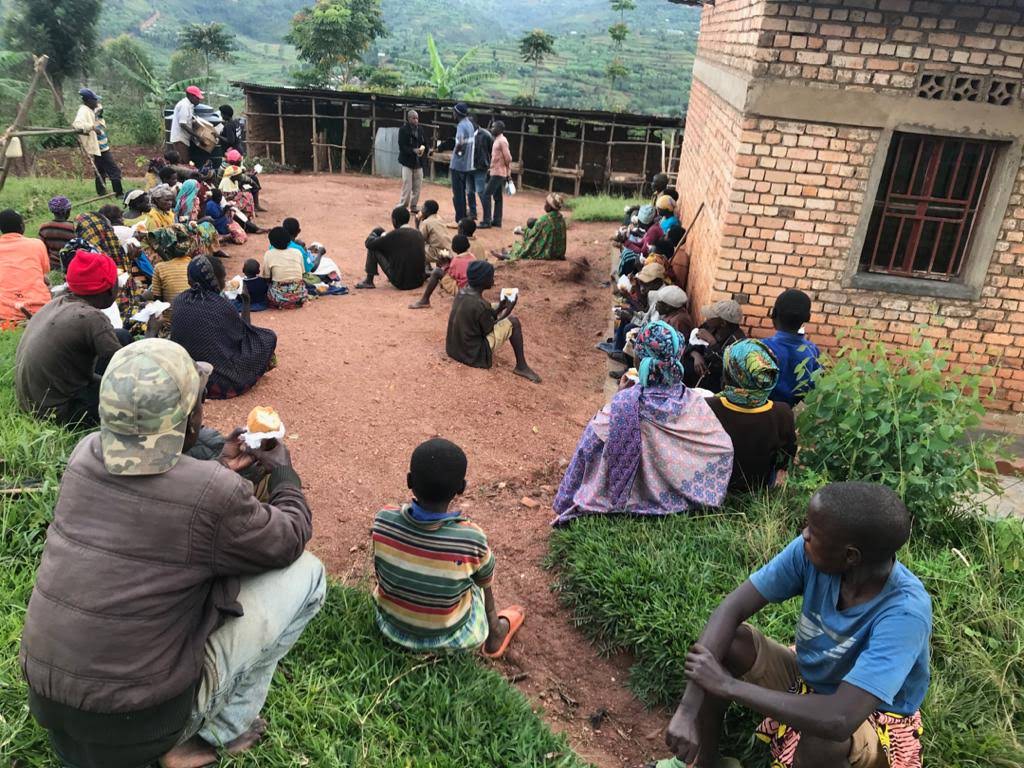 Oppdatering COVID-19 situasjon «Lock-down» fra 21.03 i 2 uker, forlenget til 18.04.20 og nå til 29 april. Myndighetene har innført at unødvendige opphold eller bevegelse utenom hjemmet er lovstridig, og dette følges opp av politiet med sjekkposter på veiene, og økt politi tilstedeværelse generelt. Reise mellom byer og distrikter er heller ikke lovlig. Jordbruk skal fortsette som «vanlig» men at helsemyndighetenes retningslinjer (avstand og håndvask) skal følges. På FRED’S FARM fikk vi på plass skjerpet hygienerutiner så snart vi kunne på gården; tilgjengelig såpe, håndvaskrutiner og vask av redskap etter dagens arbeid. Alle møter med personalet foregår utendørs, og jordarbeidere skal holde avstand under arbeid. Jacques says: «Kandagira ukarabe»: the «Hand washing system. It is made up of 5 litre jerry cans put on 3 trees, then one is stamped on and turn down the water into small jerry cans and start washing the hands without touching.» SMART!!! Agronom Jacques har ikke alltid sluppet gjennom politi sjekkpostene på hovedveien på vei til gården, selv om jordbruksarbeid er prioritert. Han har da måtte følge opp arbeid på gården pr telefon hjemmefra. Vår daglig leder, Providence, og alle arbeidere bor i gangavstand til gården, og der er det ingen sjekkposter. Så Providence sikrer at arbeid fortsetter som det skal. Overlevelse Alle i området ved gården er selvbergingsbønder, eller er jordløse. Dette betyr at de som har jord, har muligens noe matlager, men venter på nye avlinger som høstes i Mai/juni. Mens de som er jordløse overlever ved å få noe dagsarbeid. Når det er ikke mulig å bevege seg fritt, betyr det at mange er uten arbeid. På gården har vi 6 fast ansatte og 4 månedsarbeidere. I tillegg er det akkurat nå 5 dags arbeidere. Om ca. en måned har vi behov for Twa folk (pygméer) fra en nærtliggende landsby som samler og bærer organisk materialer for å dekke jordene («mulching») før tørr sesongen. Vi forsøker etter beste evnen å holde minimums aktiviteten på gården i gang, slik at ingen av disse mister arbeid. Dette betyr forskjell mellom liv og død for mange. Alt annet planlagt arbeid er satt på vent; oppstart av en ny komposteringssystem, undervisningsprogram for skolen (skolene er fortsatt stengte) TWA: siden innbyggerne i Twa landsbyen ikke får arbeid nå, er situasjonen prekært og flere givere har gitt øremerkete midler for utdeling av mat i uke 15 og 16 og ut april til alle familiene. Genocide Day 07. April: dette er den årlige markering av Folkemordet i 1994. Denne dagen er en offentlig fridag, og markeres stort over hele landet. I år var fysisk samling ikke lovlig men dagen ble markert hele dagen på radio, fjernsyn og sosiale media. Siden sist: DYR En geit døde for litt over en måned siden, antagelig grunnet en luftveisinfeksjon. Geita ble stekt og fordelt mellom arbeidere, og naboer. En umiddelbar stor glede for de som fikk mat! Men svært trist for gården. Heldigvis var denne geita ikke den som er drektig. I forrige uke føde kua, Maria, en fin hun kalv. Både mor og barn er friske! Hønene legger egg regelmessig. KAFFE Kaffen er klar til innhøsting. I forrige uke (uke 15) ble tretti fem kilo råkaffe (coffee cherries) plukket. Den ble levert til en lokal oppkjøper siden den nærmeste kaffevaskestasjon er ikke åpnet enda. Fikk betalt 220rwandesisk franc(rwf) pr kilo råkaffe. Til sammen 7700rwf, ca.kr.77. 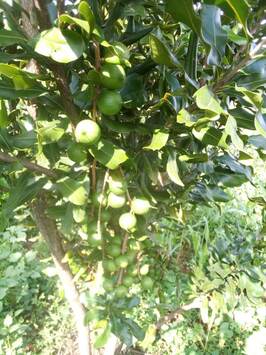 MACADAMIA TRÆR De ca.180 små trær som ble plantet ut i Januar er en veldig viktig fremtidig inntektskilde for gårdsdriften. Dermed har vi 4 arbeidere som pleier og passer godt på dem. Disse 4 jobber kun med disse. Noen av de gamle Macadamia trærne bærer nå nøtter for første gang !!! Dette er lovende. ANDRE PLANTER Moringa: Frøene er spiret og stiklinger er plantet ut. En av 6 stiklinger plantet har overlevd. Alle trærne som ble kraftig beskåret i Januar vokser ut godt nå. Fôr planter: både napier gress og bønneplanten, macuna pruriens, stor trives. Tørking av disse vekstene for tørrsesongen vil begynne om ca. en måned. Calliandra trærne er nå godt etablert og kan kappes til fôr i løpet av sommermånedene. Det er det første året at vi produserer nok til å forberede oss på denne måten. Inntekter til prosjektet svikter: vi får ikke mer kaffe siden ingen kan reise til Rwanda, og det ser ut som om det ikke blir inntekter fra Skjetlein skole i dette skoleåret. I tillegg kommer svak kronekurs som betyr at vi får mindre Rwandesiske franc pr krone. HAR DU LYST Å STØTTE VIPPS TIL 98539 Hver eneste 10 kroner kan gi arbeid til en person for en dag. 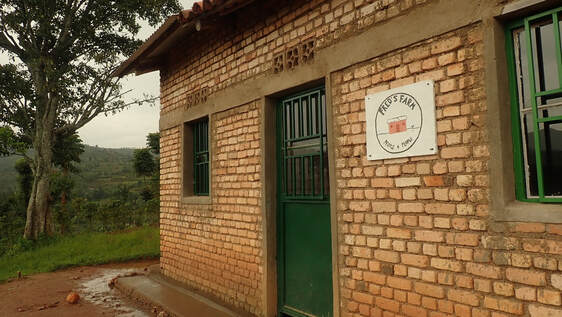 Oppdatering etter Rwanda besøk 15.01.-05.02.2020 Hjem igjen etter 3 flotte uker i Rwanda. Det er en brå og “traurig” overgang å komme tilbake til vinter Norge etter et tilskudd av Rwandas frodig og fargerikt landskap! Selv om regntiden ikke skulle begynne enda, har det vært en del uker med mye regn, tidvis enorme mengder som har skylt bort bruer, jorder og fjellsider. Gården har klart seg bra, men det er en uhyggelig påminnelse om at vi må jobbe videre med tiltak for å sikre jorden. De nye fast ansatte Venuste og Theodore trives godt på gården. Begge har familier og beskriver hvordan de begge nå har helseforsikring, deres barn går på skolen og de har mat hver dag - noe som ikke var tilfelle før de begynte å jobbe på gården. Det er svært gledelig å erfare at vår agronom, Jacques, har modnet mye i løpet av det siste året. Han tar flere gode valg både med bruk av de ressursene som er til disposisjon, og klarer bedre å planlegge mer langsiktig på gården. Under ukene vi var på gården ble det leid inn mange ekstra hender, til planting og oppfølging av ca.300 nye macadamia trær, til ugressluking og til frakting av dekompostert kaffe pulp (restprodukt i kaffevaskeprosessen). En del vedlikeholds- og forbedringsarbeid ble utført på bygningene. Det var masse aktivitet!  Bidra til at lokalbefolkningen blir styrket og i stand til å livnære seg selv Melkegeitene har det bra! Tilsammen er det 7 geiter, 2 er drektige. I samråd med distriktsveterinær, er det besluttet at geitene på FRED’S FARM skal være ren rase, men at vi skal ha en bukk som brukes for avl med lokale geiter. Avlingen med lokale geiter kommer i stand så snart en bukk født på Fred’s farm er kjønnsmoden, dvs tidligst om 1 ½ år. I dag, blir geitemelken gitt bort til de som er svært fattige og har syke barn. Nadia er et av disse barn. Mor og enke, Francine, tok Nadia til gården for å vise oss at nå er hun frisk - og å fortelle at Nadia har nettopp begynt på skole! Syv moringa trær, plantet som frø for 2 år siden, er nå etablert. Vi jobber videre med å få egen erfaring i alle ledd i dens produksjon; dyrking fra frø og stiklinger, beskjæring, og tørking av blad. Treet er svært verdigfull fordi den er hardfør, har bladverk som er svært næringsrik og så å si alle bestanddelene av treet er spisbar. I området ved gården kan dette være en svært viktig matkilde, og vi jobber svært aktivt for å få den etablert slik at vi kan tilby både frø og småplanter til så mange så mulig. Det er stor interesse lokalt blant våre arbeidere, naboer, landsbyleder, skolerektor, distriktsveterinær og distriktsagronom. På den lokale skolen skal våre egne små stiklinger plantes. Pr 01.01.2020 går 911 barn går på denne skolen og der får de et måltid med grønnsaker dyrket på skolen. Vår agronom, Jacques, har elever fra skolen på besøk på gården og har undervisning om både melkegeiter og moringa. 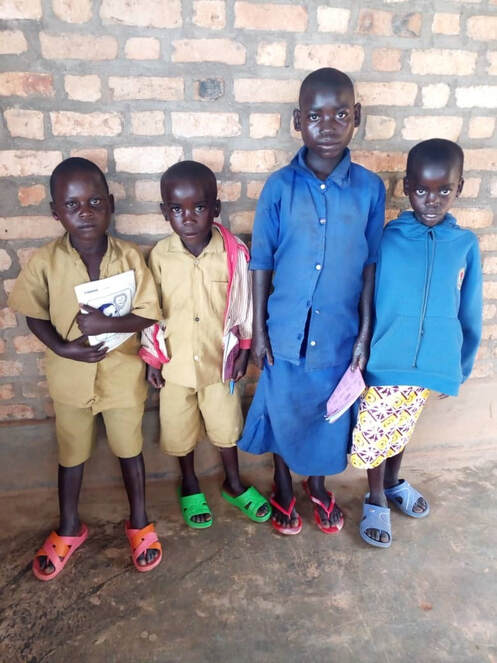 Bidra til at flere barn går på skolen Seks barn fra Twa (pygméfolket) landsbyen begynt på skolen ved nyttår! Disse er de første barna som har gått på skolen fra landsbyen. Dette ble mulig gjennom et mikrosparingstiltak vi iverksatt for 2 år siden. Halvparten av skolegangen ble betalt av mikrosparing, og halvparten ble betalt av FRED’S FARM. Mange barn i denne landsbyen har hatt sykdommen “jiggers”, en sykdom forårsaket av en parasitt. Kombinasjon av dårlig fothygiene, ingen sko og jordgulv i hjemmet gjør at denne sykdommen har vært utbredt. Vi har sørget for at de fleste av disse barn har blitt behandlet og det begynner å være kontroll over sykdommen. Å være fri for “jiggers” er en forutsetning for å begynne på skolen. Flere av de som jobber som dagsarbeidere på Fred’s Farm forteller at det er nå mulig for dem å sende flere barn på skolen. De fast ansatte sender alles deres barn på skole. Sol lampe bibliotek Ingen strøm betyr at lesing etter solnedgang ca.18.30 er så å si umulig. Det er nå etablert en “Solar lamp library” på Kizi skole! Førti syv lamper er gitt til skolen av prosjektet , og skolen etablerer et utlånssystem for elevene. Rektoren ønsker å prioritere de eldste elevene som skal ta deres avslutningseksamen på grunnskolen. Fremmer forsoning mellom ulike folk i området På gården jobber vi aktivt for å rekruttere dagsarbeidere fra alle i lokalsamfunnet. Etterhvert er det flere fra Twas landsbyen som melder interesse å jobbe på denne måten - her jobber alle bokstavelig talt skulder mot skulder med naboer som tidligere ikke hadde kontakt med hverandre. Twa har ingen egne jordlapper. Det er avsatt et landområdet på FRED’s FARM for folk fra Twa landsbyen som ønsker å dyrke. For andre år på rad brukes dette området aktivt av 2 arbeidsgrupper á 6 personer. At alle i lokalsamfunnet, inklusiv myndigheter, ser at Twa ønsker å jobbe på denne måten, har positive ringvirkninger. Fremmer mer bærekraftig jordbruk som krever mindre ressurser å produsere mat I løpet av det siste året er “intercropping” i områdene der kaffe dyrkes godt etablert. Det er plantet grunndekkende planter som kan brukes som fôr til dyrene, og belgfrukter (bønner og peanøtter), mais og bananer som spises av arbeidere på gården. I tillegg er det etablert et system der folk som har lite eller ingen jord er invitert til å kan dyrke mellom kaffebuskene. De dyrker primært søtpotet, mais og bønner. Tilsammen ble ca.400 ulike type trær plantet av prosjektet på gården i løpet av de siste ukene (i tillegg til de macadamia og moringa trær). Disse fungere som skygge for kaffebuskene, som fôr til dyrene, som jordforbedring og for å hindre jorderosjon. De skrånende områdene mellom terrassene er nå plantet med ulike gressorter (til for og jorddekke i sommermånedene) og trær. Vårt mål om å bli selvforsynt med for for dyrene på gården er nærmere enn for ett år siden! Jacques, Hanne og Sten dro på en dagstur til et prosjekt i Kamembe, en grenseby til Congo. Det innebærer en 4 timers kjøretur gjennom Ngyungwe Nasjonalpark, en tett regnskog som er hjem til et rikt fugleliv og aper av ulike sorter. Det var meldt store mengder med regn, den kom på hjemturen. Å reise gjennom en regnskog mens det regner i “bøtter og spann” i timevis er en opplevelse, men fugler og aper holdt seg godt skult! Ved Kamembe besøkte vi flere “tree nurseries” som er administrert av en engelsk NGO. Det var en inspirerende dag, og vi satser på å etablere èn eller flere “tree nurseries” i nærheten av FRED’s FARM i løpet av 2021. Kaffe og Macadamia Det er et mål at FRED’s FARM skal være økonomisk uavhengig av bidrag fra Norge i fremtiden. Kaffe og macadamia er gårdens fremtidige inntektskildene. Kaffebuskene er friskere og mer robuste enn i fjor, og råkaffen begynner så vidt å bli moden. Det forventes at innhøsting begynner i begynnelsen av mars. Avlingen forventes å bli betraktelig bedre enn fjoråret. Det brukes ingen uorganisk gjødsel på gården, kun en blanding av ku-, geit- og hønsemøkk. I tillegg brukes “worm tea” aktivt for å styrke plantene. Det har vært svært lite forekomst av sykdom på kaffen. Nytt av året er at vi har begynt å bruke dekompostert “coffee pulp”, den ytterskallen og slimaktig lag som fjernes i vaskeprosessen. Noen av macadamia trær på FRED’s FARM har endelig begynt å danne nøtter! Planting av ca.300 nye små macadamia trær var kommet i gang like før vi ankom gården. De første leveårene er en sårbar fase, og vi besluttet å ansette 3 personer frem til sommeren for å kun passe kun på disse. I tillegg er en ny person ansatt frem til sommeren med ansvar kun for kaffen. Bikuber Tross veldig synlig fugleliv og “farmer’s friends” insekter på gården, besluttet vi å få bikuber på gården som et ledd i å forbedre pollinering, Alexander bor i nærheten av gården og har lang erfaring med birøkting. Fire bikuber er nå laget og satt ut! Ranheim Fotball Vi vet fra tidligere at fotballer er stor lykke. Så vi hadde fått 2 flotte baller til å ta med ned til den lokale skolen fra Ranheim. Skolen takker så meget Felleskjøpet
Gjennom Torgrim Daling på Skjetlein Videregående Skole hadde vi fått både arbeidstøy og verneutstyr fra Felleskjøpet til å ta med ned til gården. Prosjektet takker. |
Details
Categories |
